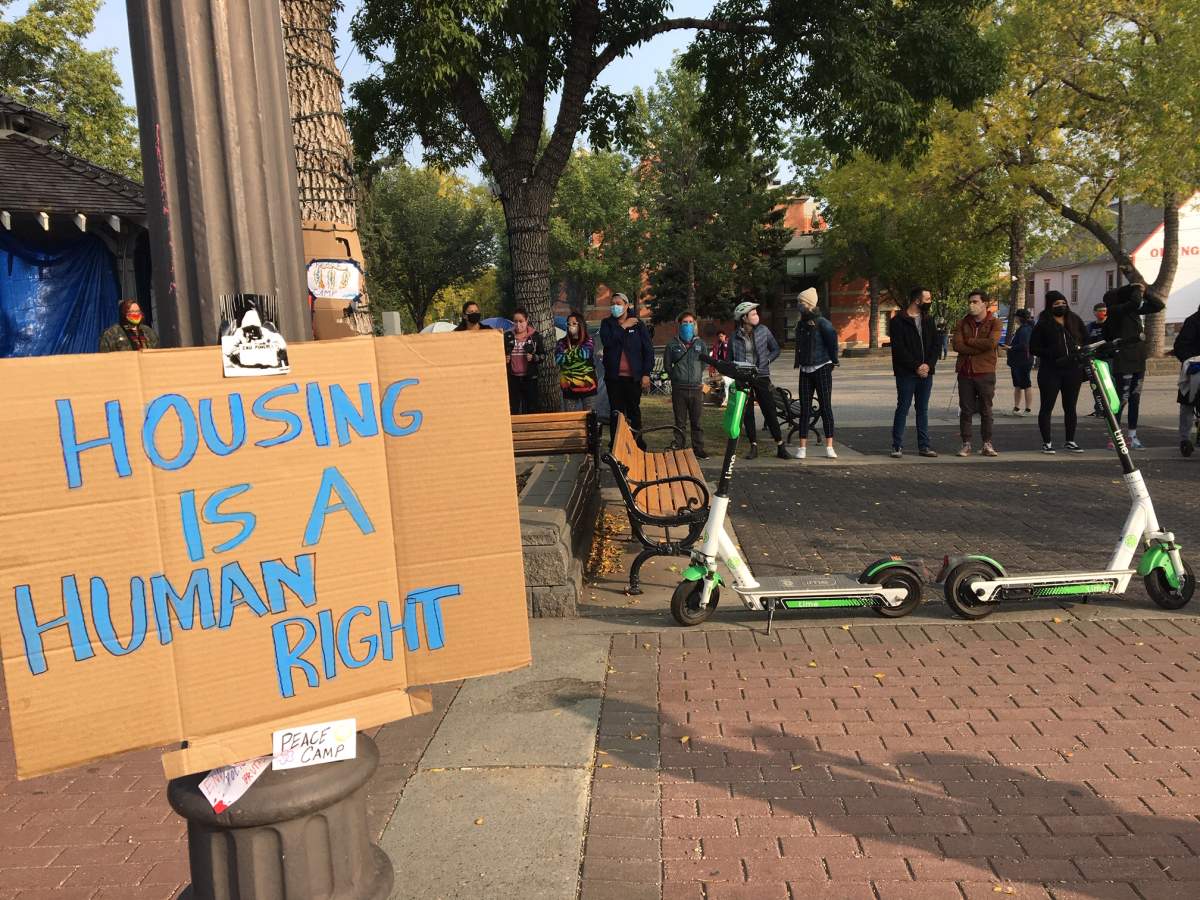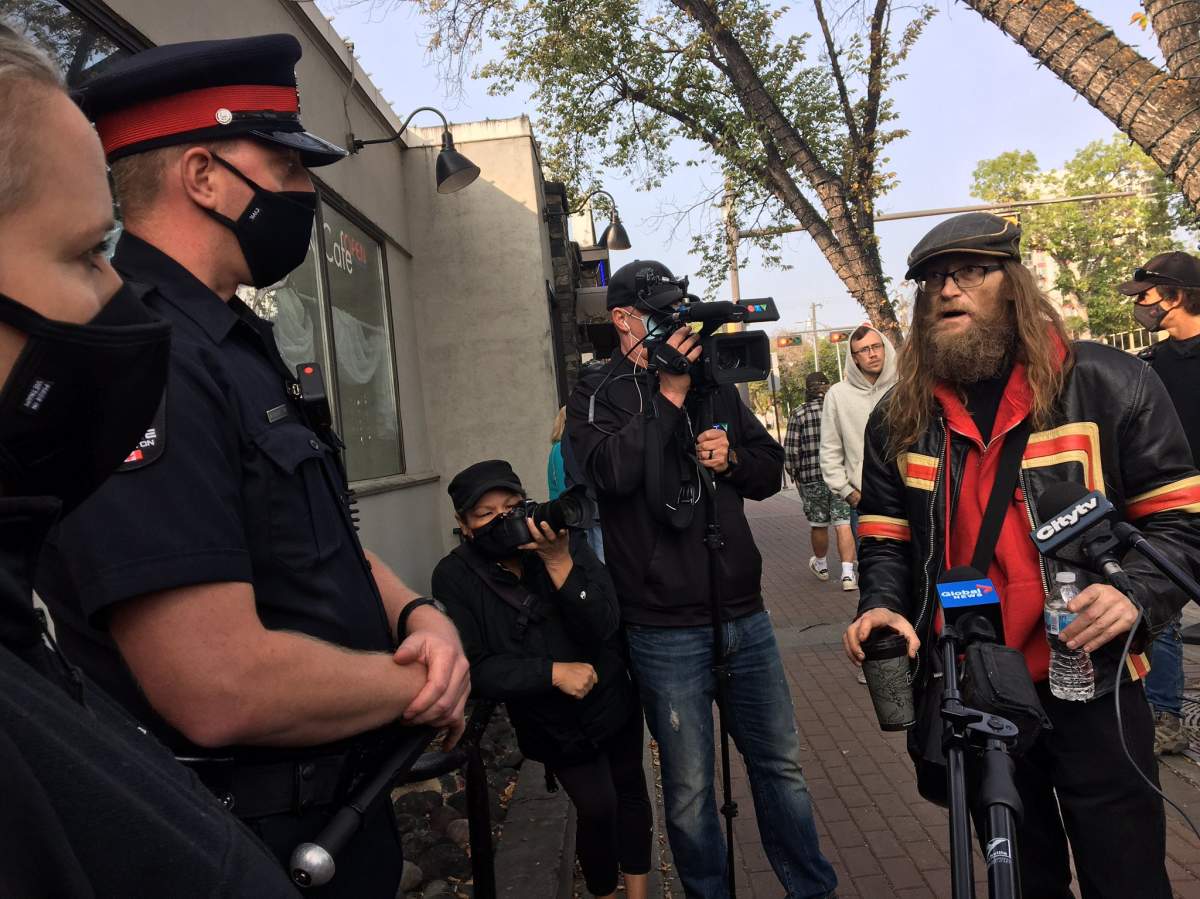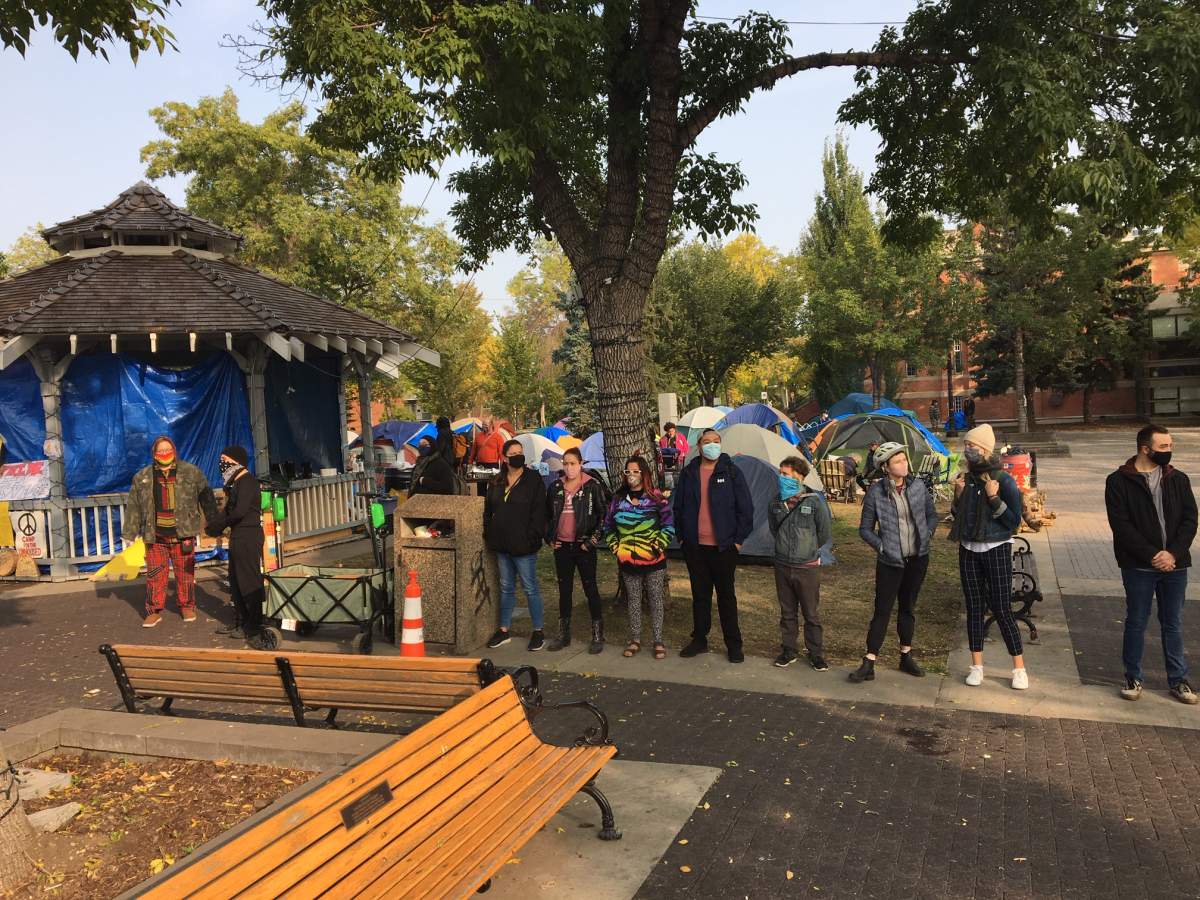The City of Edmonton said Wilbert McIntyre Park in Old Strathcona was to be cleared of tents and other structures by 10 a.m. Friday. Instead, people made a human barricade around Peace Camp Friday morning.

People there wore face masks and there were signs around the camp reading “housing is a human right.”
Supporters told Global News they were at the park to negotiate with officers and prevent them from tearing down the camp, where some people have “made their homes for now.”
“These people are just trying to live and peacefully exist here,” said Frances Bundy. “They’re here because they don’t have any other option. The cold weather is coming and… they won’t be able to be here forever. We need to be able to provide them with a better, safer option.”
READ MORE: Organizers of Old Strathcona encampment given Friday deadline to leave
Camp organizers had the chance to speak with police before peace officers planned to enter the park.
“We’re going to resist but it’s going to be non-violent resistance,” Peace Camp spokesperson Cameron Noyes said.
“We are going to help our community and the community is going to help the organizers right back. We’re all here for each other. And that’s where we’re going to stand. And we’re not going to let them take away our camp. People need this camp.”
As of noon Friday, the tents were still there and the discussion between police and camp representatives had moved off-site.
Noyes later said the group had been given a seven-day extension.
However, a city spokesperson told Global News that was not the case.
“We are continuing discussions with the organizer to facilitate a peaceful closure of the camp. No extension has been granted at this time.”
“It’s a sad day. It’s a disappointing day,” said Jackie Foord, branch manager of Social Development with the City of Edmonton.
“I don’t think any Edmontonian can be happy with the fact that we have 500 to 600 people without homes, overnight, sleeping outside in the city.
“This is a difficult situation… It brings no joy to anyone to have to stand here today and tell people to move along.”
She said the impacts of the COVID-19 pandemic have intensified the situation as there are fewer spaces for people to go during the day.

Get daily National news
“They’re setting up tents more and more. We know that tents are not a solution to homelessness.”
“The city is really empathetic with the demands of the camp and the campers. We want to see housing too. We’re working hard – I know the community is working hard – it’s not happening fast enough,” she said.
“I don’t think anyone is going to say the system is perfect and that people are housed fast enough. It’s a tough day.”
On Thursday, Noyes said the city had given the group a deadline of 10 a.m. Friday to take down tents and structures and that they must vacate the area by 11 p.m.
“We want to stay around here. We want to stay visible,” he said.
“These people are from here and that’s a big thing when people are asked to move to Hope Mission across the river. That’s a different scene,” Noyes said. “The people around here — our unhoused family — are a community.”
READ MORE: Encampment in Old Strathcona shares list of demands, including LGBT-friendly shelter
Foord said peace officers will speak with those living in the camp.
“From the very beginning of this camp, the organizer informed us that it would be a short-term protest. On several occasions he offered to give us dates when he would shut down and didn’t. So we chose the date and today is the day.
“There are concerns around this particular camp with noise, alcohol consumption, security, safety, hygiene, so just like every other larger encampment that we find in the city — and we do see many every year — it was time for this one to be vacated.”

Foord said there is room in the shelter system right now — at Hope Mission, Mustard Seed and Youth Empowerment and Support Services — but also acknowledged the barriers in the shelter system and that it’s not the long-term solution.
“We know it would be better to have a house but in the interim, while we’re working for change, the shelters are available.
“I would really encourage the protestors to sit down with the people who operate the shelters because the city doesn’t operate the shelters. They’re independent agencies that are funded by the province,” Foord said.
She stressed how hard staff at social agencies are working and how the pandemic has made their jobs even more challenging.
“They’re just working their guts out trying to house people. They’re talking to people on the street, they’re talking to people in camps, they’re talking to people as they go into agencies… They’re working really hard to get into permanent housing but there’s not enough.
“With the city, we’re working with provincial government to try to increase the stock of affordable housing,” Foord said.
READ MORE: Edmonton part of national call to repurpose hotels, motels to address homelessness before winter
- Federal government raises concerns over OpenAI safety measures after B.C. tragedy
- Canada warns First Nations people to carry passport when crossing U.S. border
- Ipsos poll suggests Canada more united than in 2019, despite Alberta tensions
- Vancouver airport ties Nexus outage to U.S. partial government shutdown
Member of Parliament for the area, Heather McPherson with the NDP, flew back from Ottawa Thursday to be at the park Friday.
“I wanted to be here today to witness what’s happening, to show my support and to acknowledge that we have not done enough in this community to help homeless people.
“I think what’s important about having people in a place like this is that it’s in front of us. We have to deal with this. We can’t continue to ignore that we aren’t taking vulnerable people in our population,” McPherson said.
“The federal government has dropped the ball. We have a national housing strategy and zero of the dollars for that strategy have come to Alberta.
“The funds haven’t been flowing and people can’t wait. There are people living here in tents but those people are going to be living in a tent in December in Edmonton. This is a crisis.”
McPherson said the city is doing the best it can but is hamstrung by the federal government and the Alberta government.
“Where are they? Why do we not have anyone from our provincial government out here today fighting for people who don’t have a place to live?”
Mayor Don Iveson said Edmonton has requested federal financial aid to help move people without places to live into bridge or transitional housing.
“Most urgently, cities across Canada are suggesting that we convert buildings like motels and hotels into permanent supportive housing so that we can better support Canadians experiencing homelessness, including those living with mental illness and substance use disorders,” Iveson said on Sept. 10.
“This is a more cost-effective measure than any short-term or temporary shelters, and supports key federal objectives to reach or exceed the national housing strategy’s aim to cut chronic homelessness in half.”














Comments
Want to discuss? Please read our Commenting Policy first.